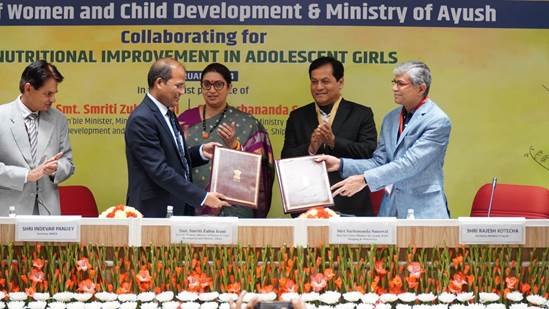The Ministry of Ayush and the Ministry of Women and Child Development have forged a Memorandum of Understanding (MoU) with the shared objective of enhancing nutrition for adolescent girls through Ayurveda interventions. This groundbreaking collaboration, announced at Vigyan Bhavan, New Delhi, is part of a joint public health initiative titled “Anaemia Control among adolescent girls using Ayurveda interventions in the five districts under Mission Utkarsh.”
The MoU signing ceremony, graced by Union Minister of Ayush, Shri Sarbananda Sonowal, and Union Minister of Women and Child Development, Smt. Smriti Irani, signals a concerted effort to combat anaemia among adolescent girls aged 14-18 in five aspirational districts across five states. These districts include Dhubri in Assam, Bastar in Chhattisgarh, Paschimi Singhbhum in Jharkhand, Gadchiroli in Maharashtra, and Dhaulpur in Rajasthan.
Under this initiative, approximately 95,000 adolescent girls residing in anaemia-prone districts, where the prevalence of anaemia is around 69.5%, will benefit from nutritional enhancement efforts. The project will be implemented across approximately 10,000 Anganwadi Centres in the selected districts, aiming to address the nutritional needs of adolescent girls effectively.
Speaking at the event, Shri Sarbananda Sonowal reiterated the commitment of both ministries to realize the vision of an ‘Anaemia Mukt Bharat’ (Anaemia Free India) as outlined by Prime Minister Narendra Modi under Mission Utkarsh. The mission aims to elevate the Key Performance Indicators (KPIs) in aspirational districts to the national average.
Smt. Smriti Irani emphasized the significance of integrating Ayush systems, supported by evidence from institutions like the Indian Council of Medical Research (ICMR), to provide cost-effective solutions for combating anaemia. She underscored the global importance of the initiative, highlighting the potential for medical communities worldwide to study and learn from the outcomes.
Vaidya Rajesh Kotecha, Secretary of the Ministry of Ayush, highlighted the adverse effects of anaemia on adolescent girls’ physical and mental capacity, emphasizing the role of traditional Indian medicine in primary healthcare settings.
Shri Indewar Pandey, Secretary of the Ministry of Women and Child Development, underscored the ministry’s commitment to addressing malnutrition among children, adolescent girls, and pregnant women through schemes like “Saksham Aanganbaadi” and “Poshan.”
The Central Council for Research in Ayurvedic Sciences (CCRAS) has already made significant strides in this area, conducting clinical trials and public health initiatives, including a national campaign on Anaemia control through Ayurveda.
The event, attended by dignitaries including Prof. Ravi Narayan Acharya, Director General of CCRAS, and representatives from WHO and ICMR, marks a pivotal moment in India’s efforts to combat anaemia and improve the health and well-being of adolescent girls through holistic Ayurveda interventions.












